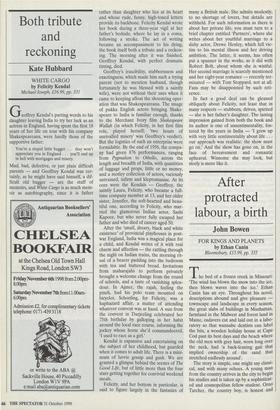Both tribute and reckoning
Kate Hubbard
Geoffrey Kendal's parting words to his daughter leaving India to try her luck as an actress in England, having spent the first 18 years of her life on tour with his company Shakespeareana, were hardly those of the supportive father:
You're a stupid little bugger . . . they won't appreciate you in England . . . you'll end up in hell with mortgages and misery.
Mad, bad, defective, or just plain difficult parents — and Geoffrey Kendal was cer- tainly, as he might have said himself, a dif- ficult old bugger — are the stuff of memoirs, and White Cargo is as much mem- oir as autobiography, since it is father
rather than daughter who lies at its heart and whose rude, funny, high-toned letters provide its backbone. Felicity Kendal wrote her book during a three-year vigil at her father's bedside, where he lay in a coma, following a stroke. The act of writing became an accompaniment to his dying, the book itself both a tribute and a reckon- ing. The morning after it was finished, Geoffrey Kendal, with perfect dramatic timing, died.
Geoffrey's irascibility, stubbornness and exactingness, which made him such a trying parent (not to mention husband, though fortunately he was blessed with a saintly wife), were not without their uses when it came to keeping afloat the shoestring oper- ation that was Shakespeareana. The image of pukka English actors bringing Shake- speare to India is familiar enough, thanks to the Merchant Ivory film Shakespeare Wallah (in which Felicity, in her first film role, played herself; 'two hours of unrivalled misery' was Geoffrey's verdict). But the logistics of such an enterprise were formidable. By the end of 1956, the compa- ny had given 876 performances, ranging from Pygmalion to Othello, across the length and breadth of India, with quantities of luggage and props, little or no money, and a motley collection of actors, variously untrained, infirm and kleptomaniac. At its core were the Kendals — Geoffrey, the saintly Laura, Felicity, who became a full- time company member at 13, and her older sister, Jennifer, the soft-hearted and beau- tiful one, according to Felicity, who mar- ried the glamorous Indian actor, Sashi Kapoor, but who never fully escaped her father and who died of cancer aged 50.
After the 'small, dreary, black and white existence' of provincial playhouses in post- war England, India was a magical place for a child, and Kendal writes of it with real charm and affection — the rattling through the night on Indian trains, the morning rit- ual of a bearer padding into the bedroom with tea and buttered bread. Invitations from maharajahs to perform privately brought a welcome change from the round of schools, and a taste of vanishing splen- dour. In Ajmer, the rajah, feeling the pinch, had his polo team mounted on bicycles. Schooling, for Felicity, was a haphazard affair, a matter of attending whatever convent was at hand. A nun from the convent in Darjeeling celebrated her 75th birthday by galloping in her habit around the local race course, informing the jockey whose horse she'd commandeered, `I used to race as a girl.'
Kendal is expansive and entertaining on the subject of her childhood, but guarded when it comes to adult life. There is a mini- mum of luwie gossip and gush. We are granted a glimpse behind the scenes of The Good Life, but of little more than the four stars getting together for convivial weekend meals.
Felicity, and her bottom in particular, is said to figure largely in the fantasies of many a British male. She admits modestly, to no shortage of lovers, but details are withheld. For such information as there is about her private life, you must turn to a brief chapter entitled 'Partners', where she writes about her youthful marriage to a dishy actor, Drewe Henley, which fell vic- tim to his mental illness and her driving ambition. The latter, it seems, has often put a spanner in the works, as it did with Robert Bolt, about whom she is wistful. Her second marriage is scarcely mentioned and her eight-year romance — recently ter- minated — with Tom Stoppard, not at all. Fans may be disappointed by such reti- cence.
In fact a good deal can be gleaned obliquely about Felicity, not least that in many respects — stubborn, driven, spirited — she is her father's daughter. The lasting impression gained from both the book and its author is one of unsentimentality, fos- tered by the years in India — 'I grew up with very little sentimentality about life . . . our approach was realistic: the show must go on.' And the show has gone on, in the face of bereavement and romantic upheaval. Winsome she may look, but steely is more like it.


















































































 Previous page
Previous page